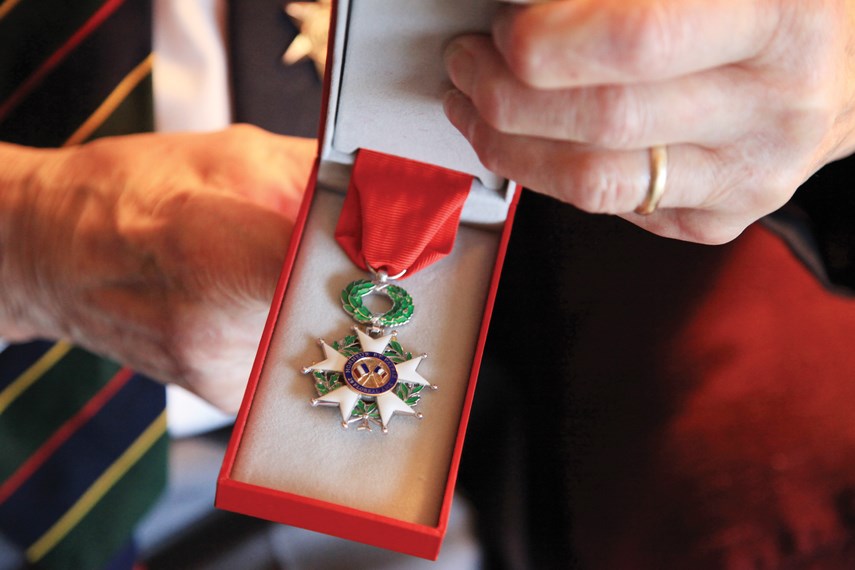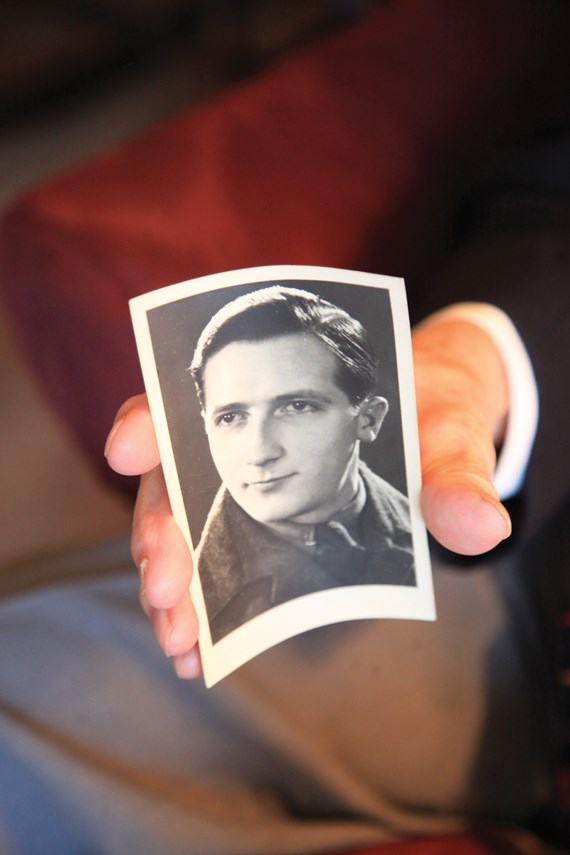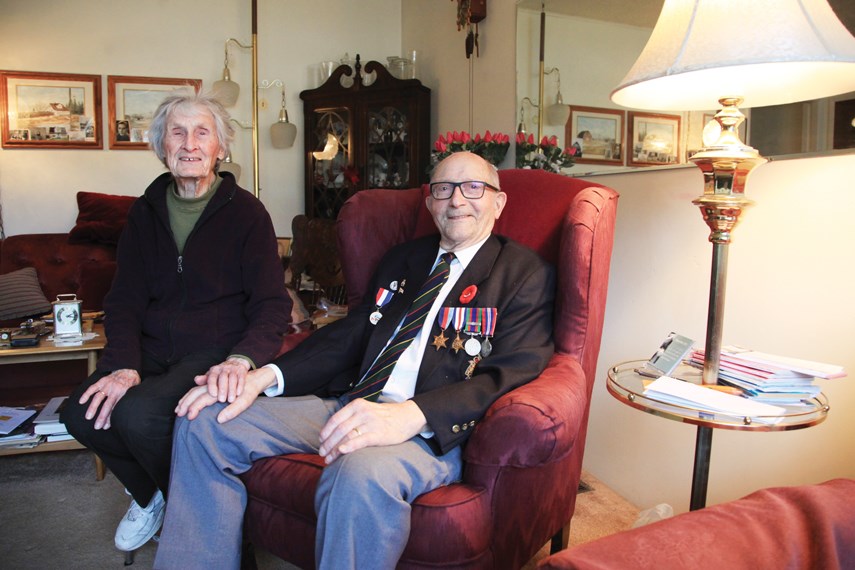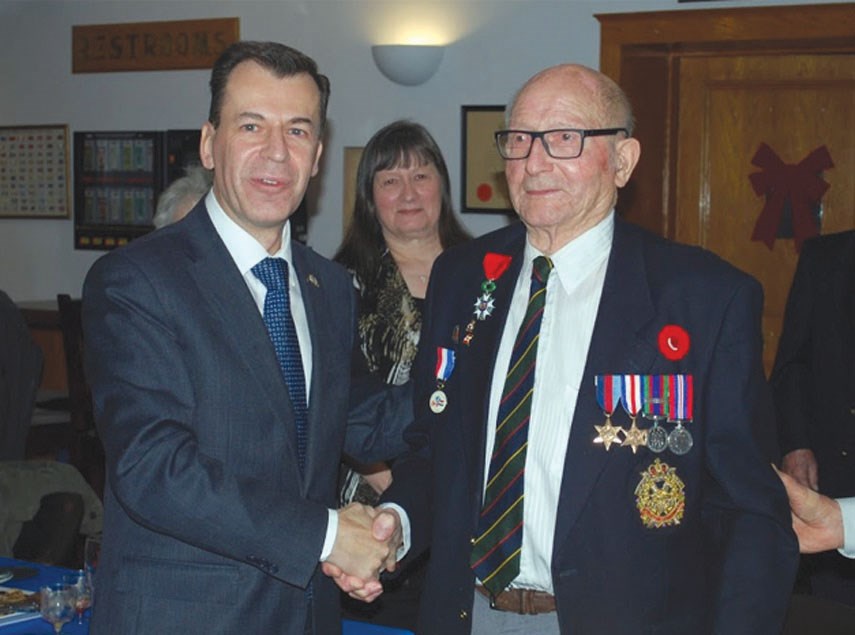With trembling hands, Virgil Billesberger grips the National Order of the Legion of Honour.
The medal has been France’s highest award for military merit since the days of Napoleon Bonaparte. It arrived in Billesberger’s mailbox Tuesday.
“You can drop it if you like, because I didn’t buy it,” the Second World War veteran offers with a grin that belies his 93 years of age.
The medal is nice, “very nice,” he says. His wife of 69 years Mary Billesberger – funny, spritely, loving – looks on.
“Do you think you deserved it?” she asks him.
Mary is abiding by the code of conduct that governs all wonderful marriages: she’s giving her partner a hard time. But with that question Billesberger turns reflective and for a moment there’s a quiver in his voice.
“Everybody else,” he manages. “Well, a lot of ’em are not here anymore.”

Billesberger grew up doing fieldwork on a Saskatchewan farm alongside three brothers and five sisters in Cudworth, a village that was just 12 years old when he was born.
While still in his teens, Billesberger headed west, working at North Vancouver’s shipyards for a stretch before enlisting.
He made his decision in part because he didn’t want to stay in Prince George.
“I thought, well if I go and I get killed here in Canada or if I get killed overseas, what the hell’s the difference? You should see the world anyway. And at no expense.”
But the trip to the front was a long one.
Billesberger smiles when he recounts hopping off the train with his two cousins in search of a beer parlour at every stop between Vancouver and Halifax.
The voyage from Halifax to Glasgow, Scotland was a different matter. Soldiers were crammed into quadruple bunk beds as the Empress of Scotland navigated the Atlantic Ocean amid what the captain later called “the roughest storm he ever came through,” Billesberger recalls.
“What a mess,” Billesberger reminisces. “I didn’t get seasick. There’s a lot of them did, right alongside of me.”
Billesberger got to the front lines in August 1944.
“The guns were going to beat all hell,” he says. “I was lucky.”

That luck was tested amid the dikes of northern France. The Highlanders had the German troops surrounded when Billesberger was walking shoulder to shoulder with his sergeant, “which we shouldn’t have,” he adds.
The sergeant grabbed his stomach and let out a grunt. Just one.
“I knew he was dead right then and there,” Billesberger says. “I bent over and I got him by the arms and was going to pull him back. It was awful heavy dragging a dead man.”
When he was out of harm’s way a buddy offered to pour him a drink – the booze went through a tracer bullet-sized hole in the bottom of his tin cup.
Reaching down for his sergeant probably saved his life, he realized.
“If I’d have been standing up I would’ve got it.”
The Highlanders spent the winter of 1944 holding a patch of land near the Reichswald Forest.
Activity during that period ranged from “the annoying of Jerry to the ‘mercy killing’ of ‘shell-shocked’ cattle and pigs,” according to the account of a Highlander soldier.
Billesberger too remembers the site of dead cattle and dead horses.
“I’ll tell you, that was a smell,” he says. “It stunk to high heaven.”
Finding food was always a struggle.
“You’ve got to eat what you get, more or less,” he says, recounting pillaging vegetables from a farm in Holland.
“We could raid the whole thing because nobody was living on the place.”
There’s a sense of lingering pleasure in Billesberger’s voice when he remembers a meal, a pillow, or a clean white sheet.
He avoided enemy fire but he was hospitalized with blood poisoning and with pneumonia.
To help him recover, his father sent him a hollowed out loaf of bread with a mickey of rum inside.
He remembers wondering if the Englishmen in the hospital with him would start talking after a drink or two.
“They started talking, oh boy!” he says.
“Some days, not too bad,” he says of his time with the Highlanders. “Other days were really bugger. But when you’re young...”
Billesberger has stories about Canadian troops finding cognac the Germans missed (“worse than whiskey, it was 90 proof just about.”) He has stories about a bomb exploding and sending trees flying near the trench where he was hiding. He has a harrowing story about moving the body of a tank driver to help his comrade escape from an orchard.
“The driver had the top of his head blown right off,” he says. “I saw his brains all over the tank.”
Billesberger also remembers the desperation of families during wartime.
“There were little kids and their dad and mom. They had a two-wheeled cart and they piled all their belongings. That was the worst part. They had no place to go to,” he says. “They’re just like the refugees now, and nobody wanted them.”
Those stories are getting fainter with time, Mary notes.
“At one time there were about 12 veterans at our church. Now we’re down to one,” she says.

Hearing Virgil’s stories again, Mary recalls the silence of the days after the Second World War.
“I didn’t talk for quite a few years,” Billesberger nods.
“We had fun there after the war. The war itself, no,” he says. “It’s getting close to that again. That old Trump ... he doesn’t know when to shut up.”
“How can you remember all that?” Mary asks.
“If you’re through it, you’ll never get rid of it.”



